Ordinary Time: February 13th
Friday of the Fifth Week of Ordinary Time
Other Commemorations: Bl. Christine of Spoleto (RM)
» Enjoy our Liturgical Seasons series of e-books!
The Pharisees came forward and began to argue with him, seeking from him a sign from heaven to test him. He sighed from the depth of his spirit and said, "Why does this generation seek a sign? Amen, I say to you, no sign will be given to this generation." Then he left them, got into the boat again, and went off to the other shore (Mark 8:11-13).
The Cross is the Sign
For the cross destroyed the enmity of God towards man, brought about the reconciliation, made the earth Heaven, associated men with angels, pulled down the citadel of death, unstrung the force of the devil, extinguished the power of sin, delivered the world from error, brought back the truth, expelled the Demons, destroyed temples, overturned altars, suppressed the sacrificial offering, implanted virtue, rounded the Churches. The cross is the will of the Father, the glory of the Son, the rejoicing of the Spirit, the boast of Paul, "for," he says, "God forbid that I should boast save in the cross of our Lord Jesus Christ."
The cross is that which is brighter than the sun, more brilliant than the sunbeam: for when the sun is darkened then the cross shines brightly: and the sun is darkened not because it is extinguished, but because it is overpowered by the brilliancy of the cross. The cross has broken our bond, it has made the prison of death ineffectual, it is the demonstration of the love of God. "For God so loved the world that He gave His only-begotten Son, that every one who believes in Him should not perish."
And again Paul says "If being enemies we were reconciled to God by the death of His Son." The cross is the impregnable wall, the invulnerable shield, the safeguard of the rich, the resource of the poor, the defence of those who are exposed to snares, the armour of those who are attacked, the means of suppressing passion, and of acquiring virtue, the wonderful and marvelous sign. "For this generation seeketh after a sign: and no sign shall be given it save the sign of Jonas"; and again Paul says, "for the Jews ask for a sign and the Greeks seek wisdom, but we preach Christ crucified." The cross opened Paradise, it brought in the robber, it conducted into the kingdom of Heaven the race of man which was about to perish, and was not worthy even of earth.
Excerpted from Homily on "Father, if it be possible..." by St. John Chrysostom
Bl. Christine of Spoleto
Blessed Christine suffered great losses early in life, causing her to reconsider seriously the goals and ambitions she had previously considered essential.
Trials brought her to a deeper level of faith in God, renewed dedication to the Church, and generous service to others. She found in Augustinian spirituality a reliable guide and support in living the Christian life, while remaining a laywoman fully engaged in the world
Agostina Camozzi was the daughter of a well-known doctor in Ostenso in the Italian province of Como. A graceful and attractive young woman, she married at an early age but within a short time was left widowed. In a second relationship she suffered the loss of her only child, a son. A subsequent marriage left her widowed again, this time at the hands of a jealous rival. In about 1450 Agostina underwent a serious conversion, became an Augustinian Tertiary, and changed her name to that of Christine.
Her life now was to be one of penance, prayer, and the works of mercy. She lived in various Augustinian convents, moving from one to another, in order to remain in obscurity as best she could. In 1457 she undertook a pilgrimage with the intention of visiting Assisi, Rome and Jerusalem. Together with another tertiary she arrived in Spoleto in the province of Perugia where she devoted herself to the care of the sick and where she died on February 13, 1458, not yet 30 years of age.
Her body was interred in the Church of Saint Nicholas in Spoleto, which at the time belonged to the Augustinians. Her reputation as a woman of holiness and a worker of numerous miracles caused devotion to Christine to spread quickly and widely. Gregory XVI confirmed her cult in 1834, proclaiming her blessed.
—Excerpted from the Augustinian Website
Patronage: Calvisano, Italy
Highlights and Things to Do:
- Read more about Bl. Christina:
- Bl. Christina's relics are located in church of Saint Gregory the Great in Spoleto, in the Umbrian region of Italy.
- There is an academic reading of the study of Blessed Christina's mummy. Her body was preserved artificially. See Idle Speculations for a short summary.








